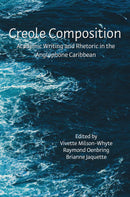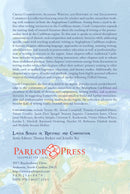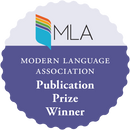





Description
Payment & Security
Your payment information is processed securely. We do not store credit card details nor have access to your credit card information.
We'll send updates on new releases, special events, great deals, freebies, and more. No more than once per month. We don't share your information with anyone.






*Winner of the Conference on College Composition and Communication's Outstanding Book Award, 12 May 2021. See https://cccc.ncte.org/cccc/awards/oba
* Winner of the Modern Language Association's Mina P. Shaughnessy Prize (14 Dec. 2020). Read MLA's Press Release (PDF).
Lauer Series in Rhetoric and Composition

Edited by Thomas Rickert and Jennifer Bay
Information and Pricing
978-1-64317-111-1 (paperback, $36); 978-1-64317-112-8 (hardcover, $75); 978-1-64317-113-5 (PDF, $19.99) © 2019 by Parlor Press, with bibliography and index. 381 pages.
Bookstores: Order by fax, mail, or phone. See our "Sales and Ordering Page" for details.
Creole Composition is a collection featuring essays by scholars and teacher-researchers working with students in/from the Anglophone Caribbean. Arising from a need to define what writing instruction in the Caribbean means, Creole Composition expands the existing body of research literature about the teaching of writing at the postsecondary level in the Caribbean region. To this end, it speaks to critical disciplinary conversations of rhetoric and composition and academic literacies while addressing specific issues with teaching academic writing to Anglophone Caribbean students. It features chapters addressing language, approaches to teaching, assessing writing, administration, and research in postsecondary education as well as professionalization of writing instructors in the region. Some chapters reflect traditional Caribbean attitudes to postsecondary writing instruction; other chapters seek to reform these traditional practices. Some chapters’ interventions emerge from discussions in writing studies while other chapters reflect their authors’ primary training in other fields, such as applied linguistics, education, and literary studies. Additionally, the chapters use a variety of styles and methods, ranging from highly personal reflective essays to theoretical pieces and empirical studies following IMRaD format.
Creole Composition, the first of its kind in the region, provides much-needed knowledge to the community of teacher-researchers in the Anglophone Caribbean and elsewhere in the fields of rhetoric and composition, writing studies, and academic literacies. In suggesting frameworks around which to build and further institutionalize and professionalize writing studies in the region, the collection advances the broader field of writing studies beyond national boundaries.
Contributors include Tyrone Ali, Annife Campbell, Tresecka Campbell-Dawes, Valerie Combie, Jacob Dyer Spiegel, Brianne Jaquette, Carmeneta Jones, Clover Jones McKenzie, Beverley Josephs, Christine E. Kozikowski, Vivette Milson-Whyte, Kendra L. Mitchell, Raymond Oenbring, Heather M. Robinson, Daidrah Smith, and Michelle Stewart-McKoy.
Vivette Milson-Whyte is a senior lecturer (associate professor) at The University of the West Indies, Mona in Jamaica, where she serves as the coordinator of the Language Section that offers courses in academic writing and technical and professional communication in the Department of Language, Linguistics and Philosophy. Her essays have appeared in JAC: A Journal of Composition Theory, Caribbean Journal of Education, and various edited collections. Her book Academic Writing Instruction for Creole-Influenced Students was named a finalist in the education/academic (nonfiction) category of the 2017 Next Generation Indie Book Awards.
Raymond Oenbring is an assistant professor in English Studies at the University of the Bahamas, where he serves as writing program coordinator. His work has appeared in a variety of academic fora, including English World-Wide, and Language, Discourse & Society, the latter article receiving in 2014 the Academic Excellence Award from the Language and Society research committee of the International Sociological Association.
Brianne Jaquette is an associate professor of English literature and culture at Western Norway University of Applied Sciences (Høgskulen på Vestlandet) in Bergen, Norway. Her work on composition and literature can be found in the Journal of the Midwest Modern Language Association, The International Journal of Bahamian Studies, Tulsa Studies in Women’s Literature, and Pedagogy.
Preface: Hurricanes, Colonialism, and Language by Vivette Milson-Whyte, Raymond Oenbring, and Brianne Jaquette | Acknowledgments | Introduction: Expanding Linguistic Diversity by Vivette Milson-Whyte, Raymond Oenbring, and Brianne Jaquette | SECTION ONE: REFLECTIONS ON LINGUISTIC TURMOIL 1 Teaching Literacy Skills in the Jamaican Creole-Speaking Environment: A Reflection by Carmeneta V. Jones | 2 Building around Nation Language: A Critical Reflection on Teaching Composition at the University of The Bahamas by Jacob Dyer Spiegel | SECTION TWO: EMPIRICAL STUDIES OF ATTITUDES AND TIME MANAGEMENT 3 Teaching on Island Time: Deadlines, Procrastination, and Composition at the University of The Bahamas by Christine E. Kozikowski | 4 Academic Writing in the Caribbean: Attitudes Matter by Melissa L. Alleyne | SECTION THREE: PERSPECTIVES ON LANGUAGE AND ERROR 5 Understanding and Shifting a Marking Community’s Response to Students’ Writing: Lessons from Jamaican Instructors’ “expression” Comments by Annife Campbell | 6 Balancing Composition and Grammar in the UTech, Jamaica Classroom by Daidrah Smith and Michelle Stewart-McKoy | 7 “African American” Anglophone Caribbean Writers in a Historically Black University Writing Center by Kendra Mitchell | SECTION FOUR: INSTITUTIONAL CONTEXTS 8 Administrators’ and Lecturers’ Perceptions of English Language-Mediated Academic Literacy Skills Development at a Jamaican University by Clover Jones McKenzie and Beverley Josephs | 9 Solving Problems and Signaling Potential in Writing Program Administration at The University of The West Indies, St. Augustine Campus (UWISTA) by Tyrone Ali | SECTION FIVE: REGIONAL PERSPECTIVES: ARCHIPELAGIC THINKING 10 The Small Island Polis: Rhetorical Pedagogy in the Caribbean by Raymond Oenbring | 11 Transnational and Translingual Perspectives on Creoles in Education: Casting a Wider Net into the Caribbean Sea by Valerie Combie | SECTION SIX: A WAY FORWARD 12 Academic Literacies: Literacy Facilitators’ Framework for Self-Empowerment in the Anglophone Caribbean Postsecondary Context by Clover Jones McKenzie and Tresecka Campbell-Dawes | 13 Postcolonial Composition: Appropriation and Abrogation in the Composition Classroom by Heather M. Robinson | Afterword: Creole Composition? | Contributors | Index
Your payment information is processed securely. We do not store credit card details nor have access to your credit card information.
Most books may be returned by retailers for full credit within 180 days of the date of the original invoice (see below for return policies for open access Titles" for the exceptions"). Books must be in resalable condition for full credit. Credit cannot be given for books that cannot be resold. Permission is unnecessary with invoice and prepaid return.
Return Address: Parlor Press, 3015 Brackenberry Drive, Anderson, SC 29621 (UPS, FedEx, or US Mail)
Please use our website contact form, call 765.409.2649, or email sales@parlorpress.com with questions.
Parlor Press publishes a large number of titles that are available online for free and also in low-cost print versions. So that we can continue to offer these titles in free online editions, we require that orders for printed copies be paid for at the time of purchase and may not be returned (unless damaged in transit). Bookstores should be aware that many instructors don't require printed versions of these titles or, even when they do, students use the free online versions. So adjust order quantities carefully! If you have questions about whether a specific title is returnable, please use our website contact form, call 765.409.2649, or email sales@parlorpress.com
If physical books, journals, magazines, comics, CDs, or DVDs you purchase from our website are damaged when you receive them, you can return them for replacement or a refund for up to thirty (30) days. Please use the site's contact form to let us know if there are any other issues of if you're not sure an item can be returned. If 30 days have gone by since your purchase, unfortunately we can’t offer you a refund or exchange.
Other physical items that you might purchase and that aren't consumable content (like a book or journal) may be returned for up to thirty (30) days for credit or a refund. To be eligible for a return, your item must be unused and in the same condition that you received it. It must also be in the original packaging.
We do not offer returns on physical books that are undamaged, ebook purchases (in PDF or EPUB format), gift cards, or other downloadable products.
To complete your return, we require a receipt or proof of purchase.
Please do not send your purchase back to the manufacturer.
Refunds (if applicable)
Once your return is received and inspected, we will send you an email to notify you that we have received your returned item. We will also notify you of the approval or rejection of your refund. If approved, then your refund will be processed, and a credit will automatically be applied to your credit card or original method of payment, within ten days.
Late or missing refunds (if applicable)
If you haven’t received an expected refund, first check your bank or card account again. It may take some time before your refund is officially posted. If you’ve done all of this and you still have not received your refund, please contact us via our site contact form.
Sale items (if applicable)
Only regular priced items may be refunded. Unfortunately sale items cannot be refunded.
Exchanges (if applicable)
We only replace items if they are defective or damaged. If you need to exchange it for the same item, use our site contact form and then send your the items to Parlor Press LLC, 3015 Brackenberry Drive, Anderson SC 29621, United States.
Gifts
If the item was marked as a gift when purchased and shipped directly to you, you’ll receive a gift credit for the value of your return. Once the returned item is received, a gift card code will be emailed to you.
If the item wasn’t marked as a gift when purchased, or the gift giver had the order shipped to themselves to give to you later, the refund will go to the gift giver, who will find out about your return.
Shipping
To return your product, you should mail it to Parlor Press LLC, 3015 Brackenberry Drive, Anderson SC 29621, United States
You will be responsible for paying for your own shipping costs for returning your item. Shipping costs are nonrefundable.
If you are shipping an item over $75, you should consider using a trackable shipping service or purchasing shipping insurance. We can't guarantee that we will receive your returned item.
We deliver worldwide.
We can ship from our distributors around the world.
Fast shipping
Most orders are processed within 24 hours.
Question about a book, series, author, or anything else?
Use our contact form to ask away.
Secure payments
All purchases are secure and private.
